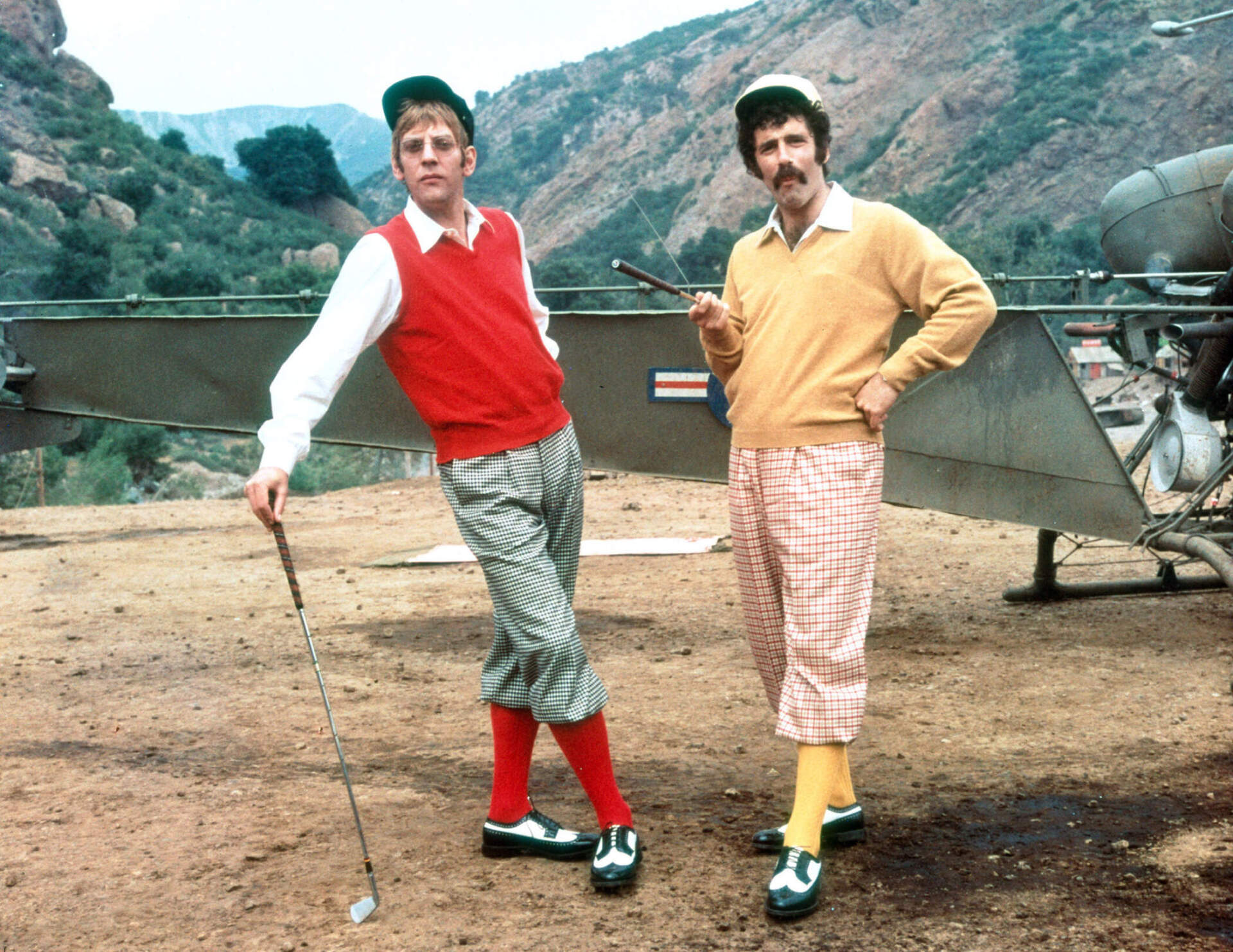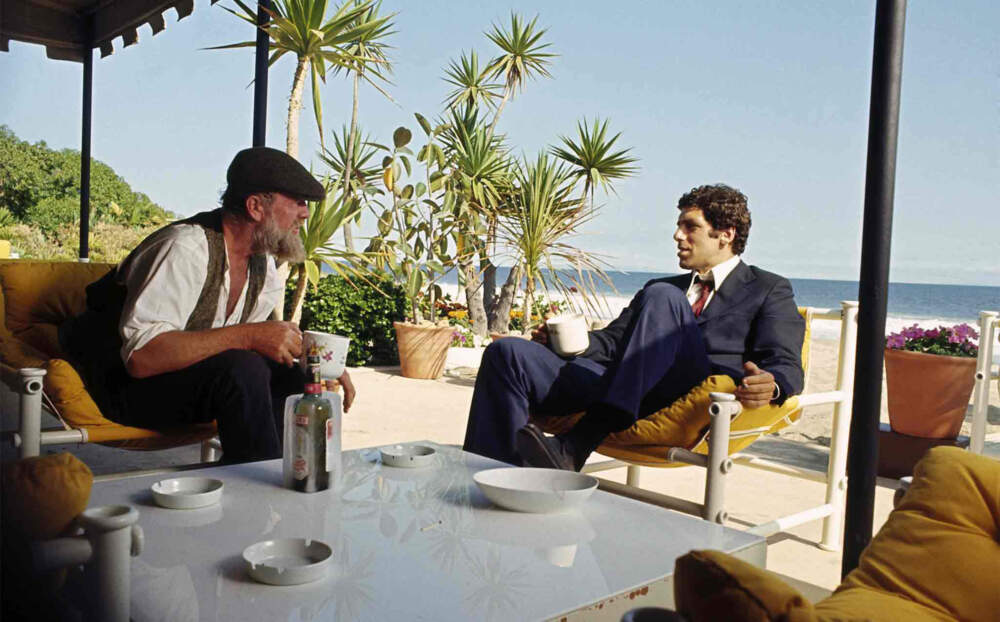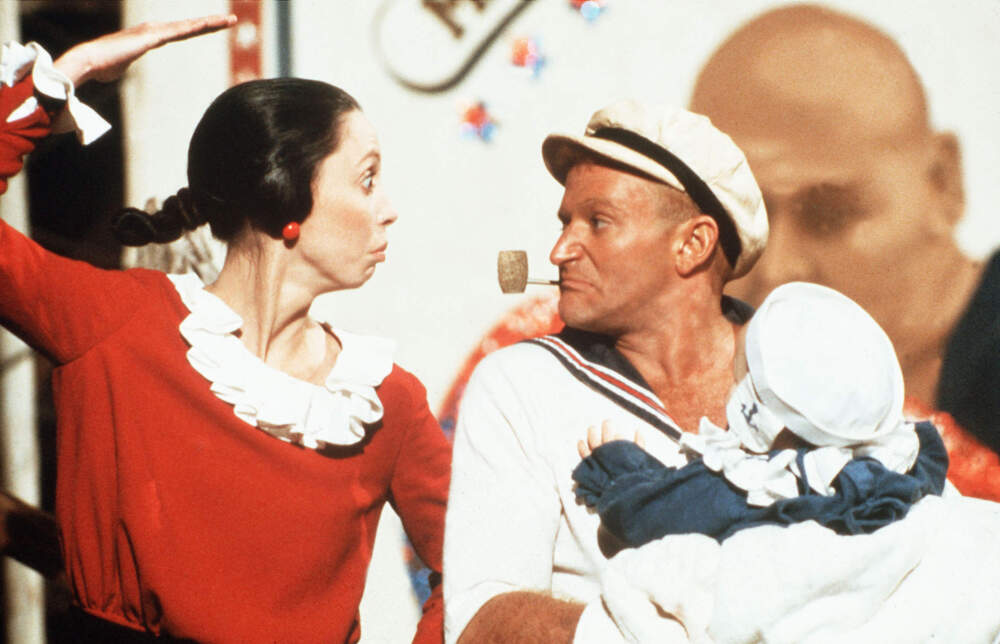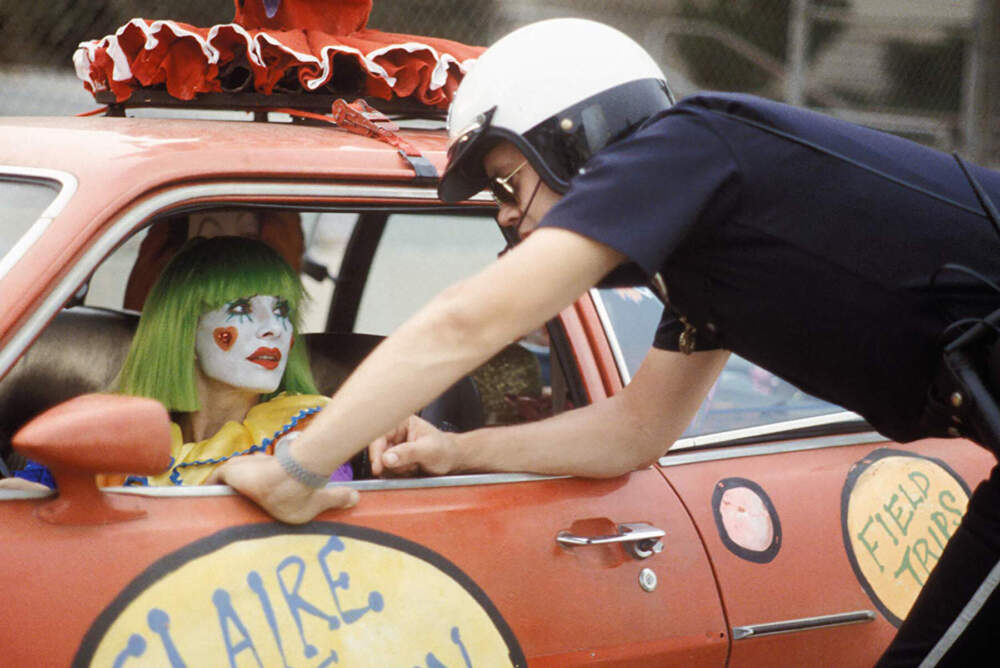Advertisement
The Brattle celebrates 100 years of Robert Altman with summer-long series

Other directors tell stories. Robert Altman explored ecosystems. No filmmaker more playfully examined the hierarchies in which we humans like to arrange ourselves, every movie a bustling community that seemed more discovered than staged. Altman’s improv-heavy, overlapping dialogue and roving camera made his pictures feel caught on the fly, brimming with babbling, picaresque ensembles who’ve been there before the movie started and will continue to live long, loopy lives after the closing credits roll.
It didn’t matter what genre Altman was working in. Whether making Westerns or a detective movie, war comedies, domestic dramas, country musicals, a British murder mystery or even a kids’ comic strip adaptation, he turned everything into an Altman movie — plot requirements secondary to his wry and slightly sardonic examinations of the human condition. Altman was affectionate but clear-eyed about the shortcomings of his characters, a collection of messy mortals doing their best to muddle through.
The filmmaker would have turned 100 years old this past February. To celebrate, the Brattle Theatre is devoting Mondays and Tuesdays for the rest of the summer to “Altmania: A Robert Altman Centennial,” which runs from July 15 through Aug. 26 and screens 16 titles from the maverick director’s five-decade career. From his boisterous 1970 breakthrough “M*A*S*H” to his 2001 triumph “Gosford Park,” the series showcases an artist who fell in and out of fashion while always remaining defiantly himself, for better and worse.
A generation older than the film school-educated New Hollywood movie brats who were redefining cinema in the ‘70s, Altman was one of those cool, counterculture oldheads who went even harder than the kids. He’d flown more than 50 B-24 bombing missions in World War II, the casualty rate for which made his survival a statistical anomaly. Altman lived the rest of his life accordingly. He was an inveterate gambler who partied like a rock star, always betting big on the next project or the next hand of cards, blithely burning bridges left and right. Actors loved him for the freedom he allowed them. Studio suits despised him for the liberties he took.
“M*A*S*H” (July 15) was the first R-rated movie I remember my parents letting me watch. I laughed so hard I fell off the living room couch. The loosey-goosey, virtually plotless saga of an army hospital unit three miles from the front line stars Donald Sutherland and Elliott Gould as insolent, exhausted surgeons sick to death of stitching up young soldiers, taking out their frustrations by sticking it to the Army brass. Their weapons-grade loutishness — even more shocking by today’s prudish standards — is presented as the only sane reaction to the madness of war.

The first major studio movie to say the f-word, “M*A*S*H” uses gross indecency to puncture the false pieties and phony patriotism of America’s war machine. The movie might be set in Korea, but it’s very much about Vietnam, where the war was still raging when the film hit theaters and became an out-of-nowhere phenomenon. The anarchic piggishness of these characters is a sign that the Army hasn’t been able to snuff out their humanity yet, and there’s a shabby nobility to these drunken slobs that’s inspiring. Heroic, even. (A few years ago, I got a chance to chat with Gould and thanked him for helping to mold my attitudes toward authority and institutions at an impressionable age. I’m still grateful, no matter how much trouble it’s gotten me into sometimes.)
“M*A*S*H” didn’t look or sound like any other movie of its era. Altman pioneered a multitrack recording system that allowed his actors to talk over each other the way we do in real life, conducting glorious cacophonies during which he’d ride the mixing faders, foregrounding stray scraps of dialogue until they turned into punchlines. He liked shooting with two cameras so the performers couldn’t be sure what the shot was, forcing them to play to each other instead of the lens. Scenes simply happen instead of being blocked around the stars, with the camera often abruptly zooming in on something more interesting going on behind them. Sutherland and Gould were initially so perplexed by Altman’s methods that they tried to have him fired, only understanding his brilliance after seeing the final product. The latter actor would go on to appear in four more Altman movies.
Advertisement
There are few things I find cooler or more amusing than the motormouthed hepcat, beautiful loser persona Gould established in those early pictures with Altman. Wearing a blazer over his Hawaiian shirt in 1974’s “California Split” (July 29), Gould stars as a degenerate gambler dragging George Segal’s mild-mannered magazine editor on a bender for the ages through racetrack grandstands and mildewed poker parlors. It’s an underappreciated, woozily melancholic gaze into the emptiness of addiction that also happens to be hilarious.
“California Split” is screening as part of a double feature with the previous year’s “The Long Goodbye” (July 29), in which Altman updated Raymond Chandler’s classic noir to the Me Decade but didn’t tell the protagonist. In a Watergate-era Los Angeles full of yoga bunnies and New Age gurus, Gould’s Philip Marlowe still wears a boxy black suit, chain-smoking and speaking in insouciant private eye slang straight out of the 1953 novel. It’s the most radical Chandler adaptation but also perhaps the most faithful in spirit, capturing the essence of the Marlowe character as the last hurrah for chivalry in a fallen world. (One of my favorite Brattle memories is of a screening in 2009 during which Gould himself sat in the front row, chowing down on a large popcorn and laughing uproariously at everything he said onscreen.)

Last month, celebrating the anniversary of “Nashville,” the Yale Film Archive posted on social media: “Robert Altman's sprawling critique of the merging of politics and entertainment, the rise of celebrity politicians, the fracturing of a disillusioned populace and media's role in spectacles of political violence premiered 50 years ago today. No comment.”
Indeed, it’s a little frightening how keyed into our current moment “Nashville” (July 21 and 22) feels half a century later. Following 24 characters jockeying for fame and fortune in Music City on the eve of the bicentennial, the film’s fleet three-hour running time builds to an ending of shocking bloodshed and unexpected grace. It's one of the great American movies, and maybe the greatest movie about America.
Of course, we can’t talk about Altman without talking about Shelley Duvall. His willowy muse was selling her artist boyfriend’s paintings out of a van in Houston, Texas, when the director asked her if she wanted to be in a movie. Their collaboration became one of cinema’s richest and most idiosyncratic. The Brattle series includes Duvall’s daffy debut in 1970’s zanily inscrutable “Brewster McCloud” (July 15), her heartbreaking turn as a lovesick Depression-era gun moll in 1972’s “Thieves Like Us” (Aug. 18) and the performance of her career, swapping personalities with Sissy Spacek in Altman’s spellbindingly abstract 1977 “3 Women” (Aug. 5). It’s a movie the director says came to him in a dream, but he lied to the studio and claimed it was based on an award-winning short story because they never would’ve financed it otherwise.
Duvall has a small role as a sex worker in “McCabe & Mrs. Miller” (July 28), Altman’s haunting 1971 Western that stars Warren Beatty as a doomed entrepreneur in over his head trying to open a brothel in a snowy mountain mining town. Believe it or not, there’s a lot of overlap between this wistful masterpiece and Altman’s notorious 1980 budget-busting boondoggle “Popeye” (Aug. 5), the comic adaptation that got him banished from Hollywood for more than a decade. (A certain critic was even crazy enough to suggest that it’s secretly a stealth remake: “McCabe for kids.”)
Altman spent the ‘80s in exile helming innovative, low-budget stage adaptations, usually for television. His 1982 “Come Back to the Five & Dime, Jimmy Dean, Jimmy Dean” (Aug. 4) drifts through the decades with a James Dean fan club reuniting in a small Texas town on the 20th anniversary of his death. The underseen film is a graceful rumination on the passage of time, and gave the world our first glimpse of what a great actress Cher could be. He eventually roared back into the mainstream with 1992’s “The Player” (Aug. 25), a caustic movie industry satire starring Tim Robbins as a shallow studio executive who gets away with murder.

It's such a gleefully hateful depiction that, of course, Hollywood loved it, welcoming back the prodigal filmmaker with open arms. To tell the truth, I’m not as enamored of Altman’s comeback era as other critics seem to be. His highly regarded 1993 “Short Cuts” (Aug. 19) stitches together nine Raymond Carver short stories in a brilliantly acted tapestry of misery, one that I can respect but never quite bring myself to love. There’s something a little too sour and nihilistic about the Altman films from the early ‘90s, which feel emotionally closed off from the surprises and humanity of his earlier work.
I personally prefer some of the gentler, late-period Altman films that didn’t make the Brattle series, like 1999’s sweet, Southern-fried murder mystery “Cookie’s Fortune,” or 2000’s criminally unloved “Dr. T & the Women,” starring Richard Gere as an overwhelmed gynecologist with female trouble. His last picture, 2006’s “A Prairie Home Companion,” was maybe the most self-reflexive final movie from any director this side of John Huston’s “The Dead,” with Virginia Madsen as a gorgeous grim reaper stalking the hallways during the last broadcast of a beloved radio show. It’s a sunny reflection on the inevitability of endings, full of tears and terrible puns.
The Brattle series instead closes out at the height of the director’s late-career acclaim. 2001’s “Gosford Park” (Aug. 26) gathered every legendary British actor who wasn’t busy being in “Harry Potter” for a smashingly entertaining, old-fashioned locked-room mystery. A miserable patriarch is murdered after a dinner party at his country estate. A house full of guests and servants all have pretty good motives, while Maggie Smith spits withering one-liners from the sidelines. You may think you’ve seen this movie before, but Altman’s approach is more like Agatha Christie by way of Jean Renoir’s “The Rules of the Game,” subordinating the central whodunit to an acerbic examination of class, duty and the power of privilege. In other words, he took a classically English tradition and turned it into an Altman movie.
“Altmania: A Robert Altman Centennial” runs at the Brattle Theatre from Tuesday, July 15, through Tuesday, Aug. 26.
